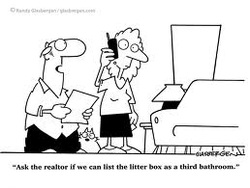 Obviously, as Real Estate professionals, one of the most frequent questions we get asked is: How are the schools? Surprisingly, we aren't allowed to discuss the quality, or competence of the schools. I know this sounds absurd, but it is true. In some ways, this is good. Everyone's standards differ and what is a good school to me, may not meet your criteria of a good school. I encourage all of my clients to do their own homework. First and foremost, unlike a decade ago, there is an abundance of information about schools on the internet. Here are a list of websites that can help with your initial search. ' Great Schools This is great first step. You can search for any school district that you are considering to see how it ranks. It will rank schools on a numerical scale from 1-10. School Digger This website begins to give you a little deeper statistical analysis of how the schools rank. Niche Rankings This is a yearly ranking by Niche. This is based on several different statistics as well as reviews from students. U.S. News ranking of High Schools in Georgia. And, finally, this is a ranking is by U.S News. This is based on four key metrics listed on the website. What next? All children and all parents are not the same. So, a great school for one student and parent may not be a great fit for another. Pay attention to things like student-teacher ratios, or whether a school offers a specific program that engages something that you child loves. Some schools have video, photography, or broadcasting classes. The key is to find the school that is right for your child. If you are seriously considering a home, head to the neighborhood when school lets out, and talk to some of the parents. Head to the school and talk with the principle and ask for a tour. Walking through the school will give you a first hand look at what your child will see everyday. And, finally, remember, that regardless of the schools ranking, the success of your particular student can be directly influenced by your involvement, and your student's hard work. Please feel free to reach out to me with any suggestions or feedback that you may have.  The Plan Collection (TPC) notes that having a haunted-looking house might be just the look you want once a year, but what about once Halloween's over? The company shares their list of the top 10 elements of a house plan design that can make any home the scariest in the neighborhood along with advice on how to fix them. 1. Eerie Architectural Style. Remember the rather "unique" look of the home in The Addams Family? Norman Bates' house on the hill in Psycho? Certain architectural styles - such as Victorian and the Second Empire style with its mansard roofs - have a long history in spooky literature and horror films. Ironically, we often associate these same styles with some of the most cheerful and charming places in the country - just think Disney's Main Street USA. 2. Lifeless Color Scheme. Dark paint colors, when used as the primary exterior color, can make almost any home look dreary, uninviting. Lighter paint colors that complement the design of your house are often the better choice for the exterior of your home. Reserve your use of darker color to areas that emphasize special features such as the trim or windows. 3. Ghostly Lighting. No one wants to knock on the door of a house without exterior lighting, but lighting features that cause heavy shadows along walk-ways or at entry points - creating that fear that something or someone might be lurking just ahead -- can be even worse. Redirecting the light features or using lower wattage bulbs is often an easy way to chase the ghosts away. If investing in new lighting, consider lamps that emphasize the beauty of your home's exterior features. 4. Zombie Landscaping. Those trees and bushes might have looked perfectly sized to the house for perhaps the first five years after planted, but don't forget... they're alive. Alive! Neglected trees and shrubs keep growing and need constant tending. Without attention, they end up surrounding your house with an "undead" feel. In addition to detracting from the house design, older, large branches are also a risk to your home in storms. Take those pruners and cut off some heads or at least give everything a good trim. 5. Suspended Maintenance. Most everyone puts at least some repairs off, but rigorous home maintenance is essential. Spring and fall are the best time of year to start checking fix-it projects off your list. Fix that step before you have to fix the entire stairs! If the exterior is starting to look dull consider power washing it. Touch up paint before a small problem becomes a big one. 6. Scary Windows. Small windows or windows covered with heavy drapery create a more somber feel. For small windows, use brighter window treatments to lighten the mood. Take advantage of any larger windows to bring outdoor light into the home. 7. Creepy Front Door. Ever have second thoughts before knocking on a front door while trick-or-treating? Well, the size and color of the entry door play a big role in making first impressions. If the front door feels uninviting, think about using a bolder, friendlier color such as a bright red, or chase away the shadows by strategically using lighting. 8. Bone Chilling Floor Plan. Small rooms and narrow hallways make for a cramped, uninviting floor plan. Consider an open concept floor plan if buying or building a house. If renovating, be sure to consult a professional before removing walls in your current home, as they may be "load bearing" walls, and will have to be replaced with other supports or structures. 9. Mysterious Staircases. Narrow staircases with walls on both sides can be dark and creepy. Lowering a wall to open the staircase up to the room or hallway below can go a long way to dispelling some of the dark, scary mystery and making your stairs more inviting. 10. Horrifying Home Décor. Dark, oversized furniture and heavy rugs can have a tendency to make a home feel less inviting. Stacks of stuff and excess clutter around the house? Not going to help the situation. Ask yourself if you really need all that stuff and if not, get rid of some of it. Reprinted with permission from RISMedia. ©2014. All rights reserved.  Edited 10/01/2013- I was dead wrong yesterday. Well, no matter which side of the isle you are on, the government shutdown could affect you. As far as Real Estate transactions go.... this is a big deal. President Obama said specifically that "Federal loans for rural communities, small business owners, families buying a home will be frozen," Yesterday, I went into each of the loan products and what the impact would be. Well, if you aren't already in process, there will be significant delays regardless of the loan product. Mortgage companies use a system to verify SSN's and another system to verify tax returns/income. These systems are obviously run by the IRS. And, these systems are currently shut down. Until the government is started back up, cash offers should carry even more weight than normal.  Wrong. This is one of the things that buyers often struggle with, but the seller has no obligation to fix the property or to reduce the price. The due diligence period, or inspection period, depending on the contract, merely affords you the opportunity to have the home inspected. There is no obligation on the seller's part to complete repairs or reduce the price in lieu of repairs. Once the inspection is complete, you can ask that the seller complete repairs. At that point, it becomes a negotiation. They may elect to fix everything you ask for, or NOTHING you ask for. There are many things that affect the seller's decision. #1) Market- If the market is a seller's market, (as it is right now in our area), the seller knows that even if you don't complete the purchase, someone else is right behind you bringing another contract. Now, conversely, two years ago, sellers just wanted to hold the contract together, so they would fix just about anything they could. #2) Financial ability- Some sellers have no money to pay for repairs, or financial flexibility to reduce the price. #3) Types of repairs- Is it a safety issue? Is it a functional issue? If so, many times, these get fixed. But, the reality is that if you are buying an existing home, and not one that is being built, there will be some minor things that the inspector can find. Even on well maintained homes. So be reasonable with what you are asking. #4) Seller's perception of your original offer- If the contract price is really lower than they wanted to go, and they feel like you are getting a 'steal' to begin with, they will be less likely to complete repairs. #5) Motivation- The market plays into this as well. However, if a seller is being transferred, or has another home under contract, or is getting a divorce, or..... fill in any scenario in which the seller has pressure to get the sale completed, then they will often agree to far more repairs in order to keep the contract and sale moving forward. #6) Type of loan- Some loans like FHA, VA, and USDA all have minimum property standards. If the inspector finds something 'should' come up when the property is appraised by the bank, then the listing agent should advise the seller to go ahead and get it fixed to keep it from being an appraisal/lending condition. #7) How long has the home been on the market- This goes into motivation as well. If the home was on the market for a week, then the seller may just elect to put it back on the market and get a buyer that is less picky. Heck, maybe one that doesn't even get an inspection. If the home has been on the market for a year, then they will be motivated to keep the sale moving forward.... of course, unless they just don't have the financial capability. I have it posted elsewhere, but you should ALWAYS get a home inspection. When you fall for a home, it is often like the beginning of a romance..... there are flaws that you just don't see. Love is blind, after all. To sum up, keep your requests to the items that would prevent you from buying the home. Try to picture being on the other side of the transaction and figure out what you would think was 'reasonable'. Example- AC is not in working order. It is reasonable to ask the seller get AC to be in good working condition. It is not reasonable to expect the seller to replace the AC if they can get the existing unit working properly.  So, a while back, I started a series about what makes a good agent. There are obviously two sides to a deal. The agent that represents the buyer, known as a buyers agent or the selling agent. Then, there is the agent that represents the seller, known as a listing agent. I wrote about some of the general things that makes a good agent with the part I of this series. Then, I posted what makes a good buyer's agent. Now, we will talk about what makes a good listing agent. #1) Knowledge- I started to try to list out everything that a good agent should know. And, well, it was a long list. Here are the five major things that jumped out at me. Property value- You don't want to ask too much and have the listing go stale, and you also don't want to under price your home and leave money on the table. (of course, in this market under priced homes are quickly bid up..so, believe it or not, it is even better to under price your home right now than to over price it) Marketing- How to get the most eyes on your property. Yes, the listing services are a great start. It is more than just that. It is having a great website that ranks highly on Google. It is featuring them on Zillow, Trulia and Realtor.com. It is about getting them on Craigslist, Facebook, and Backpage. Basically, everywhere you can get them. Some agents feel it is a waste of time to run Craigslist and Backpage ads. But, the first time homebuyer often starts there because they are comfortable with that sight. They have looked for things there already. Most people try the familiar first. Loan products and lenders- Why does this matter? The seller isn't getting a loan. The seller isn't buying the house. Why should the listing agent care? Well, there are many different loan programs out there. And, so many things depend on the type of loan. The listing agent should know the different types of loans and what the implications are. The two biggest factors that change with loan types are time to get done and repairs required. Some loan programs will require you to fix certain things. So, you may be looking at two similar offers and decide based on price alone. Only, one loan type may cost you thousands in repairs that the other would not have. Oh, and of course, if the listing agent knows the loan types, then they can help you navigate those waters more smoothly and get the house closed on time. Common negotiating strategies- So many people think that the only thing that matters is price. But, this couldn't be further from the truth. Some buyers' agents actually overbid to get the house under contract, only to then negotiate the price during due diligence. Some look to have ridiculous contingency periods that protect them long after what is reasonable and well into the realm of abusive. Some overbid, knowing that the appraisal will knock it down. Other than perhaps the first one, these are not 'improper'. They are just strategies. There are more, especially when you get into different types of sale. Many negotiations are like chess matches. The good agents see the board from many different angles. Contracts- We use standardized forms. However, so many agents have misconceptions about parts of the form. It's as if we don't need to read and understand them, because it is a 'standard' contract. And, due to this complacency, many agents put their clients in jeopardy by an improperly completed field. #2) Communication- This is one of the most common complaints I hear. This is key. Not only to the seller, but also to other agents. I know how frustrating it can be calling a listing agent to show a home and not hearing back for days. Or, calling with a question so that I can submit an offer and hearing nothing. And, of course, communicating with the seller to let them know what is going on and what you are doing to get their house sold. #3) Willingness to invest time, money and resources- Listing agents are only paid if they sell the home. Due to this, some are unwilling to invest the proper amount of time or, more importantly, money to getting the listing marketed correctly. The shortcuts that they take will help their wallet, but it certainly doesn't help your home sell or sell for as much as possible. #4) Knowing our own limitations- I do not stage homes, nor do I take the photos that go on all my marketing. I hire a certified staging specialist and a professional photographer. Does this increase my expenses and decrease my bottom line? Yes. I could easily walk around and give you mediocre staging advice. But, I know that homes sell better when staged. And, I know that those photographs are what represents your home to millions of people. This is so very important, especially in upper price ranges. It isn't just about getting your home sold. It is about getting the most for your home in the shortest amount of time. #5) Counsel- Your agent is your advocate. And, they should be willing to go to bat for you at all times. That should never change. They represent you in this transaction. However, they should also be able to put things in perspective. The other party may not be in the right. However, it may cost you more in the long run to be right, than to let the other party have their way. The agent has to be able to frame those conversations. Like I said at the beginning, there is a lot that goes into being a great listing agent. It would be hard to pick the most important. I supposed it would be integrity. A person who has integrity would work on the rest because they would know how important each of these is. What do you think the most important attributes are?  I can't tell you how many times I have went to look at a home that was listed as a four bedroom that was actually three bedrooms, or listed as having one extra bathroom. (I don't think this is often intentional by the agent, I think that most often, it is just a mistake) This may get 'more' people through the front door, but even the ones who were fine with one fewer bath or one fewer bedroom feel disappointed when they are viewing your home. And, the feeling of disappointment is not what you should be going for. I have also seen agents list the house as having one fewer bedroom or bathroom. While those who go to see it are pleased to get more than they thought, the reality is that the home was taken off the lists of several buyers who needed (or at least thought they needed) that extra bedroom or bathroom. Lot size is pretty easy to get, you just have to check tax records, yet.... I see tons of listings everyday that the lot size is incorrect, or not listed at all, and also incorrectly indexed. Square footage is difficult. I encourage my buyers not to search by square footage. Many agents don't list the square footage at all and the agents who list it often get it from tax records, which are often incorrect or hard to read. But, realize that many buyers do search by it and if you don't have the square footage indicated, or it is listed as less because the tax records are wrong, you are getting fewer buyers. And, perhaps the worst mistake of all.... incorrect school district, or failing to list a school district altogether. I see this error as much as I see any other. And, I assure you that this one thing can affect your listing as much, if not more, than any other. Especially if your home is in the suburbs in a community that appeals to families. Make no mistake that the biggest single criteria I get from families with children is school district. Sometimes it is just one district that they consider, sometimes it is a list of three possible school districts. And, it isn't always just based on academics. Sometimes it is an awesome athletic department, or an awesome theatre department, and awesome technology department, or an awesome media/journalism program. So, if your agent doesn't want to spend the 10 minutes or less necessary to determine your school district, then you could be leaving thousands of dollars on the table. And, today's real estate search engines - whether it be MLS used by agents, or consumer sites such as Zillow and Trulia - can break it down even further. We can narrow a search down the most minor details. If your home has granite counterops, but doesn't get listed as having granite countertop, then the buyer who won't buy anything without it....never sees your home. And, this is just one feature. You can search for whirlpool tub, garden tub, hardwood floors, trey ceilings, separate living and dining rooms, formal dining room, lot size, square footage...you get the picture, and that is a very, very small list. The point is to list the home accurately so that the buyers that your home fits the best actually come and look at it, and to have as many of those buyers as possible. That is how you get the best possible price for your home. So, once you have your home listed. (even if it is listed with me) Ask for a copy of the listing and then go over it. Check how they describe the home, but more importantly, make sure all the 'facts' about the house are correct. Otherwise the buyer who were hoping for is not even going to see your home, other than when they are driving by to look at another home for sale in your neighborhood.  What is a Due Diligence Contingency? When going into a contract, there are several protections for the buyer. This post will be covering the due diligence contingency. IN other words, the deal is contingent on the buyer doing their due diligence. Due diligence is defined: Reasonable steps taken by a person in order to satisfy a legal requirement, esp. in buying or selling something. The due diligence contingency is active for a specified length of time. This time is negotiable and can be any length that the parties agree on. The seller will want this as short as possible and the buyer will want this as long as possible. This length of time is called the due diligence period. The easiest way to describe the due diligence period is a period of time that the buyer can terminate the contract for any reason. This is the time that you will get your inspection completed, get any additional information about the HOA you need to know, and, well, do your due diligence. In other words, discover any and all information that would cause or preclude you from buying the home. The most common reason that someone terminates a contract during due diligence is that the inspection uncovers an issue that the seller is not willing to fix. However, as mentioned above, the buyer can terminate the contract for any reason. If at any point during the due diligence, the buyer changes their mind, they get their earnest money returned. Don't hesitate to make an offer! As many buyers, especially those purchasing below $150,000.00 realize, there is a lot of competition in the market right now. There aren't enough homes being listed and those that are are getting put under contract within days, if not hours. If you want to sleep on it, you won't have the opportunity to purchase it when you wake up in many cases. So, right now, it is imperative that you put in an offer as quickly as possible, and use the due diligence period to fully investigate it and ensure you want to go forward. Word of caution: Some REO companies do not allow for due diligence, they have an inspection period. These are a bit more restrictive in the reasons you can terminate the contract. However, these companies move slowly in responding. You won't have signed contracts for a few days. Until the contract is signed, it is not binding and you can terminate. Final word: No one wants to rush the decision to purchase a home. It is a huge purchase and you want to be sure that this is the home for you. That said, you absolutely cannot handle these decisions the way we have traditionally handled them. You can't 'think about it'. You have to act. Be decisive and know you have protections if you discover something that makes the house not work for you. Oh, and of course, make sure you have an agent that knows how to protect you, and someone that can explain all the contingencies. Happy Hunting and good luck! |
David and Amanda BlantonMake the Wise Move! Categories
All
Testimonials 557886  David is awesome to work with. He knows the area very well. He is extremely responsive, always took my calls and answered my emails and txts. He truly ... more David is awesome to work with. He knows the area very well. He is extremely responsive, always took my calls and answered my emails and txts. He truly ... more   5.0/5.0 5.0/5.0 by philipkupersavage 557657  David was extremely helpful.....We were very picky buyers & he never pressured us to look at a house outside of our parameters or place an offer... he ... more David was extremely helpful.....We were very picky buyers & he never pressured us to look at a house outside of our parameters or place an offer... he ... more   5.0/5.0 5.0/5.0 by dwcourter 309784  Mr. Blanton helped us find the home of our dreams and he did by listening to what we wanted. He taught us about the housing market, guided us in the ... more Mr. Blanton helped us find the home of our dreams and he did by listening to what we wanted. He taught us about the housing market, guided us in the ... more   5.0/5.0 5.0/5.0 by user30821228 Archives
May 2016
Categories
All
|

 RSS Feed
RSS Feed
